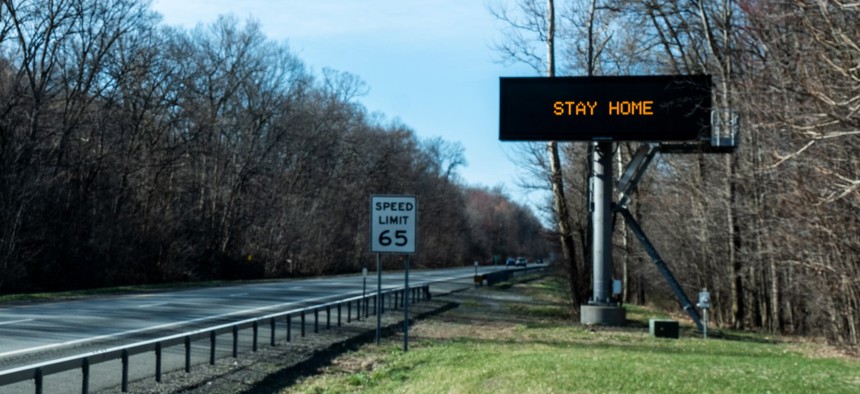
Ira L. Black/Corbis via Getty Images
Two Years Later: How the Pandemic Has Changed the Jobs and Lives of Some Federal Workers
Readers share the challenges–and silver linings–of working and keeping themselves, their families and their colleagues safe during the COVID-19 pandemic.
On March 15, 2020, the Trump administration declared that federal agencies in the Washington, D.C., area were moving to “maximum telework” due to the spread of the novel coronavirus. Many federal employees packed up and headed home indefinitely; other frontline workers had no choice but to continue reporting in person.
The date was different in some areas of the United States, but there were many constants: uncertainty about the disease itself and how to stay safe; fear of getting sick; and logistical hurdles for everything from setting up home offices and caring for dependents to finding toilet paper, protective gear and other basic supplies.
“I was a little bit freaked out,” recalled one Centers for Disease Control and Prevention employee who was brought into the office for 30 days to work on pandemic response but otherwise worked from home and asked to remain anonymous so she could speak candidly. “I don't work in a lab. I'm not a science person. This is not like my daily thing. So there's a lot of anxiety around what should I touch? What shouldn't I touch? I mean, the doors were not ajar, should I be pulling on a door? Is the surface going to be clean?”
It’s now been two years and COVID-19 has become a part of daily life to an extent few people imagined. What’s happened to federal employees in those two years? We asked and many of you reached out to share your experiences with us. You’ve told us that you switched jobs; took on new responsibilities; moved across the country to be near family; postponed retirement plans; checked in on struggling colleagues; rediscovered yoga and meditation; took walks in the woods over lunch; trained new employees and formed friendships over Zoom; and even got married.
You also felt isolated, saw friends and family members fall ill, strived to separate your work from your personal life, and missed small daily interactions.
“I really kind of am the mentor or self-guiding helper for new employees, the newbies, and I [have] missed that personal interaction,” said Lee Emery, a fishery biologist with the Federal Energy Regulatory Commission’s Office of Energy Projects who has been teleworking since March 6, 2020 but plans to return part-time to his office near Union Station in Washington, D.C. “It's really quite a puzzle palace for new people to wander in this regulatory agency and never see a boss and never see a co-worker and [they’re] trying to learn all these regulations. It's got to be very tough.”
Some of you have enjoyed returning to the office at least occasionally, while others have decided they will never go back.
“I can absolutely tell you with certainty that if the position I'm in required us to return on site, I would look for other employment. Without hesitation,” said Polly Giardina, assistant chief of health information management services for the VA Pittsburgh Healthcare System. Giardina now goes into the office one day a week and works remotely on the others, a setup she finds is “the perfect balance to accommodating people being able to live their lives well.”
What follows are just a few of your responses, lightly edited for length and clarity. You can hear more of your colleagues’ stories in a two-part series on our GovExec Daily podcast March 16-17 and in a live conversation on the Clubhouse app on March 17 from 3-4:30 p.m. ET.
Click on a name to read the interview:
Airport screener (anonymous), Transportation Security Administration
Dionne Dent-Lockett, Veterans Affairs Department
Shannon Downey, Forest Service






